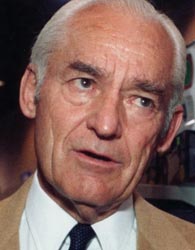For good or for ill, Walmart founder Sam Walton changed the retail landscape of America with his chain of discount stores.
Sam Walton’s Early Days
Samuel Moore Walton was born on March 29, 1918, in Kingfisher, Oklahoma, to Thomas and Nancy Lee Walton. In high school, Sam Walton excelled in various areas: he was student council president, Missouri’s youngest Eagle Scout and quarterback of the state champion football team.
PBS Online Newshour notes that while pursuing an economics degree at the University of Missouri at Columbia, Walton “delivered papers, waited tables and worked at a five-and-dime store.” After graduation, he briefly worked at J.C. Penneys, where he learned to do more with less during a visit from James Cash Penney. During World War II, he served as a captain in Army Intelligence.
Sources in this Story
- The New York Times: Sam Walton Is Dead At 74; the Founder of Wal-Mart Stores
- PBS Online NewsHour: Biography: Sam Walton
- Fortune magazine: America’s Most Successful Merchant
- Time: The Time 100 Builders and Titans: Sam Walton
- Harvard Business School: Sam Walton: Great From the Start
- Walmart Today: The “Highlight” of Sam Walton’s Career: The Presidential Medal of Freedom
- Google Book Search: The Ten Rules of Success of Sam Walton: by Michael Bergdahl
- Making Change at Walmart: About Us
- Brave New Films: “Walmart: The High Cost of Low Price”
Walton’s Notable Accomplishments
After the war, Walton began to buy Ben Franklin discount franchises with his brother James Walton. When management rejected Sam Walton’s plan to open bigger stores in rural America was denied, he decided to pursue the scheme with his own company and Wal-Mart was born.
Sam Walton was known for working long days, often starting at 4:30 in the morning and working until late at night. Before the company grew too large, he would visit each store at least once a year, often flying there himself in his small private plane. His nearly unshakeable self-confidence, attention to detail and a keen understanding of how to make large-scale discount retail work made Walton a phenomenal success. According to a Time magazine profile, once Walton decided to pursue discount stores he had one mission in life: “to drive costs out of the merchandising system wherever they lay—in the stores, in the manufacturers’ profit margins and with the middleman—all in the service of driving prices down, down, down.”
Harvard Business School professor Richard S. Tedlow notes that “If there was inspiration in…[Sam Walton’s] business strategy, it lay in the next step…he discounted his merchandise, passing the savings he achieved on to the consumer, and made his profit on volume rather than on margin.”
The Rest of the Story
On March 17, 1992, Sam Walton was given America’s highest civilian award: the Presidential Medal of Freedom by President George Bush. Less than a month later, on April 5, 1992, Sam Walton died one of the richest men in America.
In the foreword of “The Ten Rules of Sam Walton,” by Michael Bergdahl, Sam Walton’s son S. Robson Walton writes that his father “believed strongly in the power of people” and that “his values live on at the 6,700 stores that serve hundreds of millions of customers every week, all around the world.” Some of Sam Walton’s “Rules” include “Commit to achieving success and always be passionate,” and “Swim upstream, be different, and challenge the status quo.”
The Man and His Work
- “The 10 Rules of Sam Walton: Success Secrets for Remarkable Results” by Michael Bergdahl
- “Sam Walton: Made In America” by Sam Walton with John Huey
- “Walmart: The High Cost of Low Price” (DVD)
But not everyone has the same high opinion of Sam Walton’s legacy. The organization Making Change at Walmart describes itself as a campaign to change Walmart into a more responsible employer. According to the campaign, which is run by the United Food and Commercial Workers International Union, “Walmart is owned by one of the richest families in the country but its workers still struggle with poverty wages, erratic schedules, understaffed and under-stocked stores, and mistreatment from management. We believe Walmart can afford to do better and that change at Walmart would mean change for retail employees everywhere.”
A documentary, “Walmart: The High Cost of Low Price,” depicts what the filmmakers see as Walmart’s “assault on families and American values,” arguing that Walmart drives down wages in a given area, forces local businesses to close, prices its employees’ health insurance too high and encourages unpaid overtime.
This article was originally written by Kate Davey; it was updated February 24, 2017.











